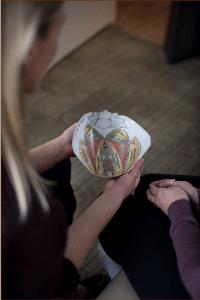Incontinence and Pelvic Organ Prolapse Management

Our therapists have all taken advanced training in the treatment of female urinary incontinence and pelvic organ prolapse. Assessment often includes filling out a bladder diary and also includes internal assessment of the pelvic floor muscles. If there are any indications that you are not controlling intra-abdominal pressure well, a more global assessment will be completed.
It is helpful to imagine that the thorax and pelvis is like a toothpaste tube, the abdominal contents are the "paste", and the pelvic floor muscles are the "cap." Sometimes, the problem is that the cap is not screwed on (weak pelvic floor muscles), sometimes the problem is that the paste is too runny (the organ support system has been damaged) and sometimes the problem is that the tube is being squeezed (abdominal or thoracic control issue that increases intra-abdominal pressure).
It is essential that your therapist takes the time to determine the contributing factors for your specific problem so that your problem can be adequately and thoroughly addressed.



